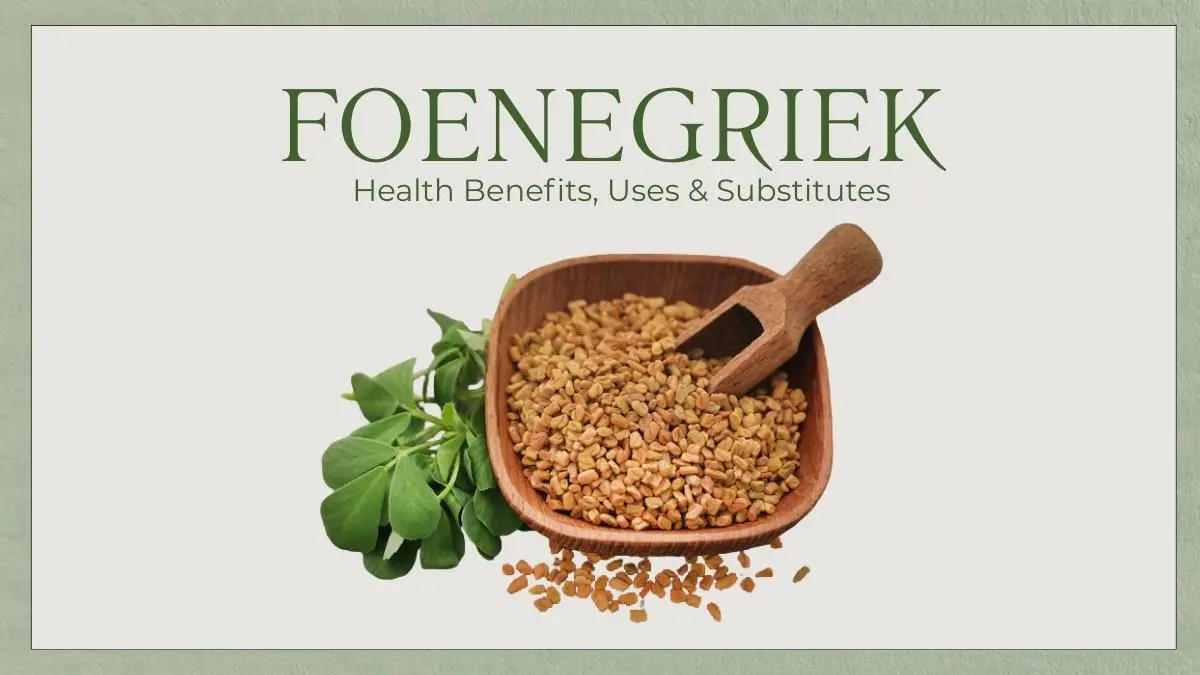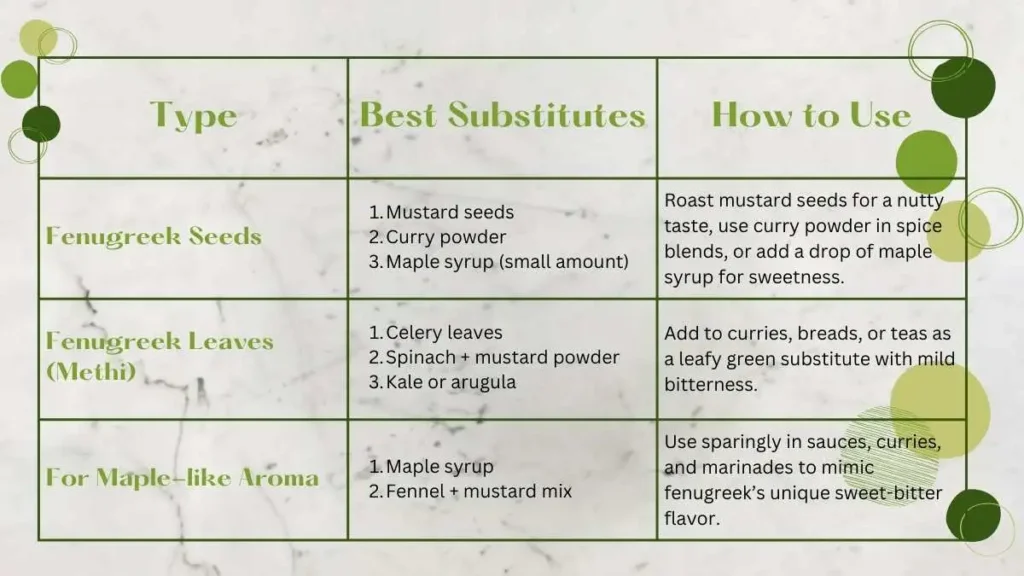HEALTH AND FITNESS
Foenegriek (Fenugreek): Health Benefits, Uses & Substitutes

Foenegriek refers to fenugreek seeds and leaves, which are widely used in global cuisines and traditional medicine systems. The seeds are small, complex, and yellow-brown with a nutty, bitter flavor that intensifies when roasted. Fresh or dried leaves are also edible and often used in curries, breads, and teas.
Belonging to the Fabaceae (legume) family, foenegriek is native to the Mediterranean region, South Asia, and North Africa. Today, it is cultivated worldwide due to its demand as a culinary spice and a medicinal herb.
Table of Contents
Historical and Cultural Background
Fenugreek has a long-standing history dating back thousands of years. Ancient Egyptians used it in embalming rituals, while Greek and Roman physicians recommended it for respiratory and digestive conditions. In Ayurveda and Traditional Chinese Medicine, foenegriek is highly regarded as a warming herb that supports balance in the body.
In the Netherlands, the term foenegriek refers to this versatile herb, highlighting its cross-cultural presence in traditional cooking and natural healing practices.
Botanical Description
Foenegriek is an annual plant that grows between 60–90 cm tall. It has light green leaves arranged in trifoliate patterns and produces pale white to yellow flowers. Once matured, the plant forms slender pods containing 10–20 hard seeds. These seeds are the most valued part of the plant, although the fresh leaves are also widely consumed in various cuisines.

Culinary Uses of Foenegriek
1. In Indian Cuisine
Foenegriek is essential in Indian cooking. Seeds are often dry-roasted to reduce bitterness and release a nutty aroma, making them ideal for spice blends like garam masala and curry powders. The leaves are also used in dishes such as methi paratha (fenugreek flatbread) and dal methi.
2. In Middle Eastern and North African Cuisine
In Yemeni and Ethiopian cooking, fenugreek seeds are ground into pastes or sauces, while in North Africa, they add depth to tagines and slow-cooked stews.
3. As a Flavor Enhancer in the West
In the Netherlands and other European countries, Fenugreek is occasionally used to flavor cheeses, breads, and herbal teas, bringing a unique aromatic depth.
Nutritional Profile of Foenegriek Seeds
Fenugreek is more than a spice; it’s nutrient-dense:
- Proteins & Amino Acids: Supports muscle growth and repair.
- Fiber: Aids in digestion and helps regulate appetite.
- Vitamins: Rich in Vitamin A, C, and several B vitamins.
- Minerals: Contains iron, magnesium, manganese, and copper.
- Phytochemicals: Includes saponins and flavonoids, contributing to its medicinal effects.
Health Benefits of Foenegriek
1. Supports Digestive Health
Foenegriek seeds are high in soluble fiber, which can help ease constipation, support gut health, and reduce symptoms of acid reflux.
2. Natural Aid for Lactation
For centuries, nursing mothers have used fenugreek as a galactagogue, a natural substance that may boost breast milk production. Many studies suggest that its phytoestrogen content supports this effect.
3. Regulates Blood Sugar
One of its most researched benefits is its ability to support healthy blood sugar levels. Compounds like 4-hydroxyisoleucine in its seeds help improve insulin sensitivity, making it useful for people managing type 2 diabetes.
4. Balances Cholesterol
Research indicates that fenugreek seeds may reduce LDL cholesterol and triglycerides while raising HDL Cholesterol, supporting heart health.
5. Anti-Inflammatory Properties
Foenegriek contains antioxidants and bioactive compounds that may reduce inflammation, making it beneficial for arthritis and skin irritation.
6. Hormonal and Reproductive Health
Foenegriek has traditionally been linked to enhanced female hormonal balance and even male vitality. Some supplements claim benefits for libido and testosterone, though more research is needed.
What Can You Use Instead of Foenegriek?

Traditional and Modern Herbal Medicine
In Ayurveda, it is considered warming, balancing vata and kapha doshas, and improving digestion and circulation. In Chinese Medicine, it is used to treat weakness, pain, and cold-related disorders.
Today, the seeds are widely available as:
- Capsules & Tablets for standardized supplementation.
- Herbal teas are made from crushed seeds.
- Powders used in smoothies or cooking.
- Topical pastes for skin health and inflammation.
Recent Studies and Insights
Foenegriek continues to attract global scientific attention:
- Clinical Trial (Diabetes & Metabolic Syndrome Journal): Fenugreek extract improved insulin sensitivity in type 2 diabetes patients within 12 weeks.
- Nutrition Study (Frontiers in Nutrition): Reported fenugreek’s saponins and flavonoids may reduce systemic inflammation markers, suggesting potential benefits for arthritis and chronic inflammation.
- Herbal Review (Journal of Ethnopharmacology): Reinforced its role as a natural galactagogue, supporting safe lactation for new mothers.
Precautions
- Pregnant women should avoid high doses, as they may stimulate uterine contractions.
- Individuals with diabetes should monitor blood sugar closely when taking fenugreek.
- Possible side effects include mild digestive upset or a maple-syrup-like odor in sweat and urine.
How to Use Foenegriek in Daily Life
- Add roasted seeds to soups, curries, and stews.
- Mix powdered seeds in smoothies for a nutritional boost.
- Sprout seeds for salads and sandwiches.
- Brew herbal tea from crushed seeds for digestive relief.
- Cook with fresh or dried leaves for authentic Indian or Middle Eastern flavor.
FAQs
1. Can foenegriek help with weight loss?
The seeds may support weight loss by increasing satiety and reducing appetite.
2. Is foenegriek suitable for hair growth?
The seeds are often used in hair masks to strengthen roots, reduce dandruff, and promote hair growth.
3. Can foenegriek improve testosterone levels in men?
Some studies suggest that fenugreek supplements may help naturally boost testosterone and enhance vitality.
Conclusion
Foenegriek, the Dutch word for fenugreek, is more than just a spice. It is a culinary treasure and a natural medicine, valued across cultures for centuries. With its ability to enhance flavors, support digestion, promote lactation, regulate blood sugar, and contribute to heart health, fenugreek is unique in both kitchens and pharmacies.
This article is for informational purposes only and is not a substitute for medical advice. Consult a healthcare professional before use.
-

 GENERAL7 months ago
GENERAL7 months agoChristofle – For Those Who Dream of Family Heirloom Silver
-

 SPORTS9 months ago
SPORTS9 months agoDiscover the World of Football with Streameast: Watch Your Favorite Leagues and Tournaments
-

 GENERAL3 weeks ago
GENERAL3 weeks agoUncovering the World of кинокрадко: The Dark Side of Film Piracy
-

 GENERAL3 months ago
GENERAL3 months agoATFBooru: Anime, Gaming, and Subculture Imageboard























